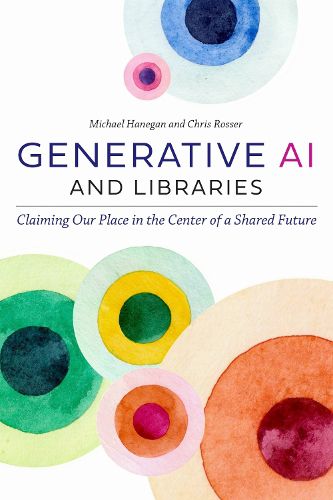Readings Newsletter
Become a Readings Member to make your shopping experience even easier.
Sign in or sign up for free!
You’re not far away from qualifying for FREE standard shipping within Australia
You’ve qualified for FREE standard shipping within Australia
The cart is loading…






This title is printed to order. This book may have been self-published. If so, we cannot guarantee the quality of the content. In the main most books will have gone through the editing process however some may not. We therefore suggest that you be aware of this before ordering this book. If in doubt check either the author or publisher’s details as we are unable to accept any returns unless they are faulty. Please contact us if you have any questions.
In the form of generative AI, libraries are facing technological transformation of unprecedented speed and scale. Both controversial and disruptive, the sudden ubiquity of AI has already triggered uncertainty as well as the need for rapid adaptation. As AI reshapes how humans learn, work, and interact with information, libraries across the ecosystem-from public to academic, from school to special libraries-must resist the temptation to merely serve as static support and instead claim the center by becoming a dynamic, positive influence. Because, as the authors of this book persuasively argue, libraries are uniquely positioned to lead AI's ethical and human-centered integration within communities. Blending theory and concepts with an unswervingly pragmatic approach, from this book readers will
be introduced to foundational principles and frameworks for navigating the so-called "Age of Intelligence" that provide useful guiderails no matter how AI technology actively evolves;
delve into the complex ethical considerations of AI, including bias, equity, privacy, misinformation, and the potential impact on human agency and dignity;
receive guidance related to stakeholder engagement, resource allocation, and the need for continuous learning and adaptation;
discover practical models for evaluating and implementing AI tools thoughtfully and effectively in ways that align with libraries' values and mission;
become familiar with STACKS, an approach for learning, problem solving, and innovation with generative AI;
explore AI literacy as an expression of metaliteracy using seven frames for instruction and learning; and
walk away with a sense of how libraries can actively define their essential role as leaders and shapers of the AI landscape, ensuring their continued value and preventing marginalization.
As this book demonstrates, by embracing their unique position as ethical stewards and trusted guides, libraries have an unprecedented opportunity to shape how AI transforms society-not from the margins, but from the center of a shared future.
$9.00 standard shipping within Australia
FREE standard shipping within Australia for orders over $100.00
Express & International shipping calculated at checkout
Stock availability can be subject to change without notice. We recommend calling the shop or contacting our online team to check availability of low stock items. Please see our Shopping Online page for more details.
This title is printed to order. This book may have been self-published. If so, we cannot guarantee the quality of the content. In the main most books will have gone through the editing process however some may not. We therefore suggest that you be aware of this before ordering this book. If in doubt check either the author or publisher’s details as we are unable to accept any returns unless they are faulty. Please contact us if you have any questions.
In the form of generative AI, libraries are facing technological transformation of unprecedented speed and scale. Both controversial and disruptive, the sudden ubiquity of AI has already triggered uncertainty as well as the need for rapid adaptation. As AI reshapes how humans learn, work, and interact with information, libraries across the ecosystem-from public to academic, from school to special libraries-must resist the temptation to merely serve as static support and instead claim the center by becoming a dynamic, positive influence. Because, as the authors of this book persuasively argue, libraries are uniquely positioned to lead AI's ethical and human-centered integration within communities. Blending theory and concepts with an unswervingly pragmatic approach, from this book readers will
be introduced to foundational principles and frameworks for navigating the so-called "Age of Intelligence" that provide useful guiderails no matter how AI technology actively evolves;
delve into the complex ethical considerations of AI, including bias, equity, privacy, misinformation, and the potential impact on human agency and dignity;
receive guidance related to stakeholder engagement, resource allocation, and the need for continuous learning and adaptation;
discover practical models for evaluating and implementing AI tools thoughtfully and effectively in ways that align with libraries' values and mission;
become familiar with STACKS, an approach for learning, problem solving, and innovation with generative AI;
explore AI literacy as an expression of metaliteracy using seven frames for instruction and learning; and
walk away with a sense of how libraries can actively define their essential role as leaders and shapers of the AI landscape, ensuring their continued value and preventing marginalization.
As this book demonstrates, by embracing their unique position as ethical stewards and trusted guides, libraries have an unprecedented opportunity to shape how AI transforms society-not from the margins, but from the center of a shared future.